News archive 2021

New bacteria in UK waters as temperatures rise
Rising temperatures are causing a "growing diversity" of Vibrio bacteria in the sea around the UK, new research shows.

New research moves closer to harnessing viruses to fight bacteria and reduce antibiotic use
New research has moved a step closer to harnessing viruses to fight bacterial infection, reducing the threat of antibiotic resistance.

Unique data creates 'fair and robust' online exams
Researchers have developed a new way of reinforcing "fair and robust" online exams, a study reports.
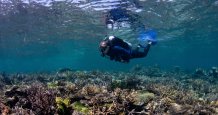
Newly discovered fish songs demonstrate reef restoration success
Whoops, croaks, growls, raspberries and foghorns are among the sounds that demonstrate the success of a coral reef restoration project.
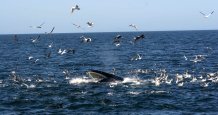
Big-city coastal whales consume millions of microplastics every day
Whales in New Zealand's Hauraki Gulf consume about three million microplastics per day, a new study has found.

Extent of migration of sooty terns presents conservation challenges
Sooty terns’ wide-ranging migration patterns present big challenges for conservationists working to understand and address a sharp population decline, according to scientists.

Social media firms can tackle wildlife trade
Wildlife trading on social media is a complex issue – but tech firms can take steps to tackle it, according to new research.
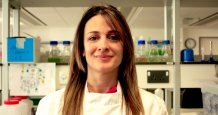
Exeter lab manager wins Sustainability Champion Award
A University of Exeter lab manager has been named a "Sustainability Champion" in the 2021 Green Gown Awards UK & Ireland.
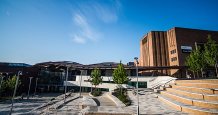
Exeter academics on list of top researchers
Twenty-two University of Exeter academics have been named on an annual list of highly cited researchers.
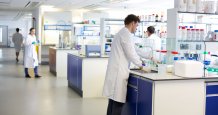
Exeter laboratories gain LEAF status
More than 80% of eligible laboratories and research spaces at the University of Exeter have now been assessed via the Laboratory Efficiency Assessment Framework (LEAF).
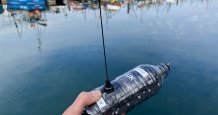
COP26: Plastic pollution trackers released off Scotland
On the penultimate day of COP26, scientists have deployed plastic pollution tracking devices into the ocean around Scotland.
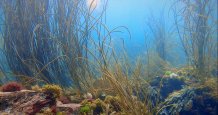
Convex launches Seascape Survey Partnership with Blue Marine Foundation
Convex Group Limited (Convex) today announces a multi-million-dollar partnership with the Blue Marine Foundation (BLUE), a charity dedicated to restoring the ocean to health, and the University of Exeter and its foremost researchers, with the launch ofthe Convex Blue Carbon Seascape Survey.

Leprosy confirmed in wild chimpanzees
Leprosy has been found in wild chimpanzees for the first time, a new study reveals.
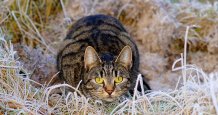
Cats' whiskers reveal felines favour free lunch
Domestic cats that regularly catch wild animals still get most of their nutrition from food provided at home, new research shows.

Desert teamwork explains global pattern of co-operation in birds
A new study from the Kalahari Desert finds that teamwork allows birds to cope with brutally unpredictable environments.

Hoverflies navigate using sun and body clock
Hoverflies use a combination of the sun and their body clock to navigate when they fly south for the winter, new research shows.
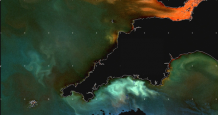
Artificial Intelligence could help predict harmful algal blooms
A new project will develop Artificial Intelligence tools to predict harmful blooms of algae in the ocean.

Rapid increase in global light pollution
Global light pollution has increased by at least 49% over 25 years, new research shows.
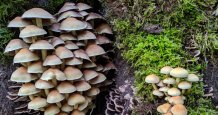
Unrealistic experiments mean true impact of nitrogen pollution on the environment is unknown, study warns
Unrealistic scientific experiments mean the true impact of nitrogen pollution on the environment remains poorly understood, a new study warns.
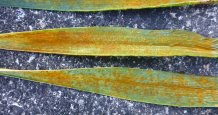
Crop farmers face new disease pressures as climate changes
Climate change will increase the burden of crop diseases in some parts of the world and reduce it in others, new research suggests.
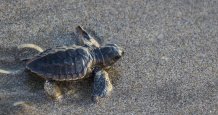
Plastic creates 'evolutionary trap' for young sea turtles
Plastic pollution creates an "evolutionary trap" for young sea turtles, new research shows.
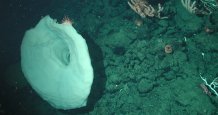
Warning over start of commercial-scale deep-sea mining
Deep-sea mining in international waters could begin in two years – but researchers say this is unnecessary and could cause irreversible damage to marine ecosystems.

Hands, face, space to protect great apes
Tourists who visit Africa's gorillas, chimpanzees and bonobos should follow social distancing rules, researchers say.
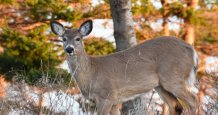
Red Dead Redemption 2 teaches players about wildlife
Players of the popular game Red Dead Redemption 2 learn how to identify real American wildlife, new research shows.
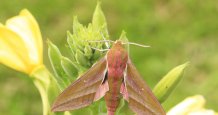
Light pollution has complex effects on animal vision
Changes in the colour and intensity of light pollution over the past few decades result in complex and unpredictable effects on animal vision, new research shows.
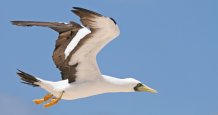
Seabird colony creates 'halo' of depleted fish stocks
A vast seabird colony on Ascension Island creates a "halo" in which fewer fish live, new research shows.

£250,000 kickstart for University of Exeter microbiologist
Dr Stineke Van Houte has received £250,000 to support her research into antimicrobial resistance.

Jackdaws don't console traumatised mates
Male jackdaws don't stick around to console their mate after a traumatic experience, new research shows.
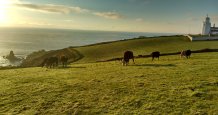
Cornish farmers could unlock 'natural capital' worth millions
Cornwall's farmers could unlock "natural capital" worth millions of pounds, a new report suggests.
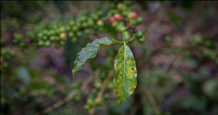
COVID-19’s socio-economic fallout threatens global coffee industry
COVID-19’s socio-economic effects will likely cause another severe production crisis in the coffee industry, according to new research.

Bird migration takes plants in wrong direction to cope with climate change
Migratory birds carry most seeds in the wrong direction to help plants cope with climate change, new research shows.

Mongooses solve inequality problem
A fair society has evolved in banded mongooses because parents don’t know which pups are their own, new research shows.

Seabird eggs contaminated with cocktail of plastic additives
Chemical additives used in plastic production have been found in herring gull eggs, new research shows.
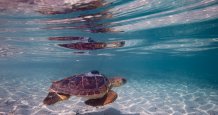
Turtle's tale reveals dual fishing threat
The story of a turtle caught twice in fishing nets reveals a dual threat facing many ocean animals.

G7 'legacy' project launched to protect and restore nature across Cornwall
The UK government has pledged an initial £700,000 for a nature recovery project in Cornwall as a "legacy" of this week's G7 summit.
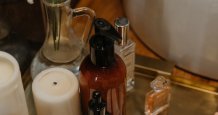
Research project receives €6M to boost greener consumer products in Europe using innovative biotechnology
A pioneering, pan-European research project, designed to boost greener industrial processes for more sustainable daily consumer products like cosmetics or foods, has been launched.

Experiments show natural selection opposes sexual selection
Natural selection can reverse evolution that occurs through sexual selection and this can lead to better females, new research shows.
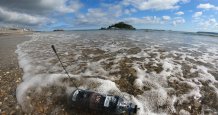
Plastic project launches bottle for each G7 nation
On World Ocean Day, June 8, a collaboration of scientific institutions and ocean groups from around the world will launch scientific monitoring devices into the ocean.
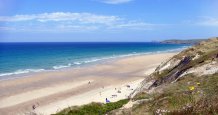
South West scores 65 out of 100 for ocean health
South West England has scored 65 out of 100 for ocean health, a new report reveals.

New findings show pigeons act selflessly when under threat
A new study of pigeons has revealed that they flock together in the presence of predators for the collective benefit, rather than for selfish interest.
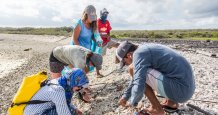
Plastic in Galapagos seawater, beaches and animals
Plastic pollution has been found in seawater, on beaches and inside marine animals at the Galapagos Islands.

Exeter researcher wins prestigious paediatric infectious diseases award
Professor Adilia Warris, co-director of The MRC Centre for Medical Mycology based at the University of Exeter, has received this year’s Bill Marshall Award for her pioneering paediatric infectious diseases research.
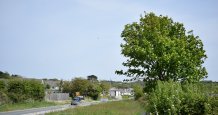
Road verges provide opportunity for wildflowers, bees and trees
Road verges cover 1.2% of land in Great Britain – an area the size of Dorset – and could be managed to help wildlife, new research shows.
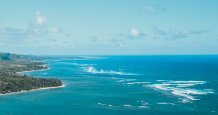
G7 ministers must 'listen to the science'
G7 ministers meeting this week must "listen to the science" and protect the world's ocean, according to researchers and conversation organisations.
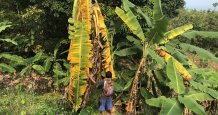
New tools needed to prevent plant disease pandemics
Plant disease surveillance, improved detection systems and predictive modelling – integrated at the global scale – are necessary to mitigate future plant disease outbreaks and protect the global food supply, researchers say.
_feat_218x115.jpg)
Study uncovers drivers of fishers' decisions of where to fish
A team of researchers from ZSL’s Institute of Zoology and the University of Exeter, alongside Oceanswell, have used a new approach to understand the movement and drivers of commercial fishing fleet activity in one of the world’s most over-exploited oceans.
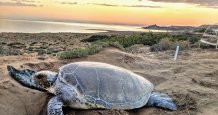
Mediterranean turtles recovering at different rates
Numbers of two Mediterranean turtle species have risen in the last three decades – but in Cyprus the recoveries are happening at different rates, new research shows.
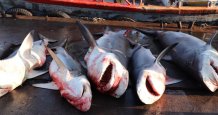
Sharks in protected area attract illegal fishers
Thousands of sharks have been illegally caught in a Marine Protected Area (MPA) in the Indian Ocean, new research shows.
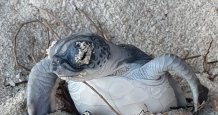
Cayman Islands sea turtles back from the brink
Sea turtles in the Cayman Islands are recovering from the brink of local extinction, new research shows.
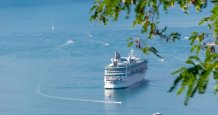
Ship traffic dropped during first months of Covid pandemic
Ship movements on the world's oceans dropped in the first half of 2020 as Covid-19 restrictions came into force, a new study shows.
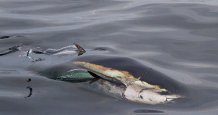
UK waters are home again to the bluefin tuna
Atlantic bluefin tuna have returned to UK waters and can once again be seen during the summer and autumn months.

Exeter academics awarded grants for pioneering fungal research
Two scientists from the The MRC Centre for Medical Mycology, based at the University of Exeter, have received prestigious Springboard Awards from The Academy of Medical Sciences for their research into a deadly fungal disease.
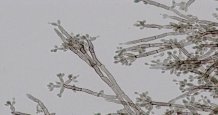
Five-year funding boost for fungal research centre
A leading fungal research centre has received a further five years' funding from the Medical Research Council (MRC).
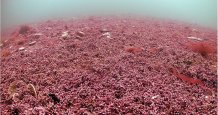
Scientists discover unique Cornish 'falgae'
Red algae that grow in Cornwall's Fal Estuary are genetically unique, new research shows.

Friends and enemies 'make sense' for long-lived animals
It makes evolutionary sense for long-lived animals to have complex social relationships – such as friends and enemies – researchers say.
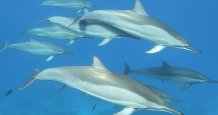
Ocean's mammals at crucial crossroads
The ocean’s mammals are at a crucial crossroads – with some at risk of extinction and others showing signs of recovery, researchers say.
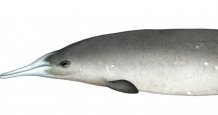
Gray’s beaked whales 'resilient' to ecosystem changes
An elusive whale species in the Southern Ocean could be resilient to near-future ecosystem changes, according to a new study by the universities of Exeter and Copenhagen.

Amphibians that produce fewer offspring have increased extinction risk
The risk of extinction among amphibians – the most endangered animals on the planet – increases for species that produce fewer babies per birth, new research shows.
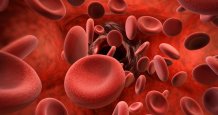
New findings about immune system reaction to malaria and sickle cell disease
Scientists have discovered in more detail than ever before how the human body’s immune system reacts to malaria and sickle cell disease.
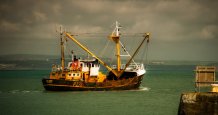
Fishers at risk in 'perfect storm'
Stormier weather will increasingly force fishers to choose between their safety and income, researchers say.
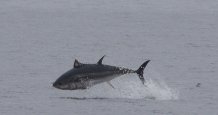
€4 million project uses cutting-edge technology to enhance the habitats of key fish species
A cross-Channel partnership will use innovative underwater acoustic tracking technology to identify the environmental conditions a range of important marine species need in order to thrive.
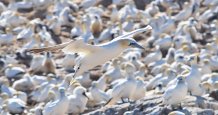
Female gannets go the extra mile to feed chicks
Female gannets travel further than male gannets to find fish for their chicks in some years but not others, new research shows.
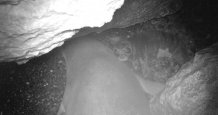
Rarest seal breeding site discovered
Scientists have discovered a previously unknown breeding site used by the world's rarest seal species.
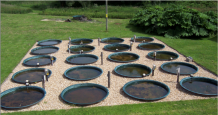
Global warming poses threat to food chains
Rising temperatures could reduce the efficiency of food chains and threaten the survival of larger animals, new research shows.

Exeter researcher writes book for Attenborough series
A University of Exeter scientist has written a book to accompany a new Sir David Attenborough TV series.

Chimpanzees and humans share overlapping territories
Chimpanzees and humans "overlap" in their use of forests and even villages, new research shows.

Cell biology specialist joins fungal research team
A specialist in cell biology and genetics is set to join the University of Exeter’s leading fungal research centre.

Play and meaty food reduce hunting by cats
Domestic cats hunt wildlife less if owners play with them daily and feed them a meat-rich food, new research shows.

Common pipistrelle bats attracted to wind turbines
One of the most abundant bats in Europe may be attracted to wind turbines, a new study shows.
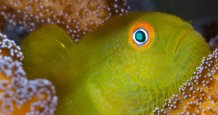
Family ties explain mysterious social life of coral gobies
The strange social structure of tiny fish called emerald coral gobies may be explained by family loyalty, new research shows.
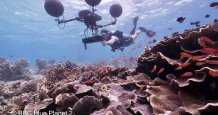
Healthy oceans need healthy soundscapes
Oceans were once filled with the sounds of nature, but overfishing, climate change and human noise have fundamentally changed the natural underwater "soundtrack", researchers say.
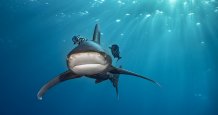
Ocean sharks and rays threatened with extinction
Three quarters of ocean shark and ray species face an elevated risk of extinction, according to new research.
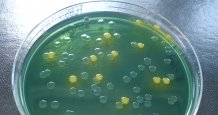
Breakthrough in understanding 'tummy bug' bacteria
Scientists have discovered how bacteria commonly responsible for seafood-related stomach upsets can go dormant and then "wake up".

Genital shape key to male flies' sexual success
Having genitals of a certain shape and size gives male flies a major reproductive advantage, new research shows.

Exeter researcher receives prestigious Association for the Study of Animal Behaviour (ASAB) Award
Dr Neeltje Boogert from the University of Exeter’s Penryn Campus in Cornwall has won the 2021 ASAB Christopher Barnard Award for Outstanding Contributions by a New Investigator.

Grey camouflage 'better than zebra stripes'
Dull, featureless camouflage provides better protection from predators than zebra stripes, according to a new study.

New research sheds light on early mechanisms driving diatom bloom formation
Scientists have discovered how diatoms (a globally important group of eukaryotic algae) sense the availability of phosphorus, a vital macronutrient that controls diatom growth and productivity in the oceans.
